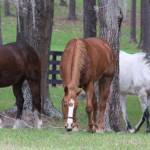Birdsfoot Trefoil for Horses

Because of its nutrient profile and high palatability, alfalfa is sometimes used as a grazing forage for horses, often in concert with grasses. When growing conditions are challenging for alfalfa cultivation, birdsfoot trefoil is an appropriate, though lesser-known, source of good-quality protein and energy for horses. Birdsfoot trefoil is a perennial legume that is often grown as a forage source for sheep and cattle, and is nutritious for horses as well.
Birdsfoot trefoil grows well on poor-quality soil. It is tolerant of poorly drained and mildly acidic soils, and it grows well in late summer, when growth of some other dryland legumes or grasses slows. Birdsfoot trefoil reseeds itself and does best when seeded with other grasses.
Though palatable to most livestock, birdsfoot trefoil contains tannins, which are bitter, so some horses find it objectionable. Horses that are familiar with birdsfoot trefoil graze it like other pasture grasses but may avoid it if alternate forage is available.
Birdsfoot trefoil, like alfalfa, can be subject to certain molds that may cause photosensitivity and slobbers if consumed in sufficient quantity. Some varieties of birdsfoot trefoil can contain naturally occurring prussic acid, more commonly known as cyanide, which accumulates in plants under certain conditions, including after a killing frost, in rapidly growing young plants, and plants grown in soil with high nitrogen and low phosphorus and potassium. Although horses are less susceptible to cyanide poisoning than cattle and other ruminants, a variety of birdsfoot trefoil that does not produce prussic acid should be sown in horse pastures.
In general, birdsfoot trefoil can be used in pastures to safely supplement protein and energy to horses. It should be combined with other grass varieties, such as Kentucky bluegrass, orchardgrass, or timothy. It should not be the only forage source available, but it is quite useful for providing nutrition when growth of grasses slows in later parts of summer.
Horses on all-forage diets should be fed a well-formulated supplement or balancer pellet designed to provide important vitamins and minerals not found in forage. Kentucky Equine Research offers low-intake concentrated sources of vitamins and minerals, which are ideal for horses that maintain body weight on diets composed entirely of forage.
If you have questions about supplementing your horse’s forage-only diet, contact a Kentucky Equine Research nutrition advisor today.








